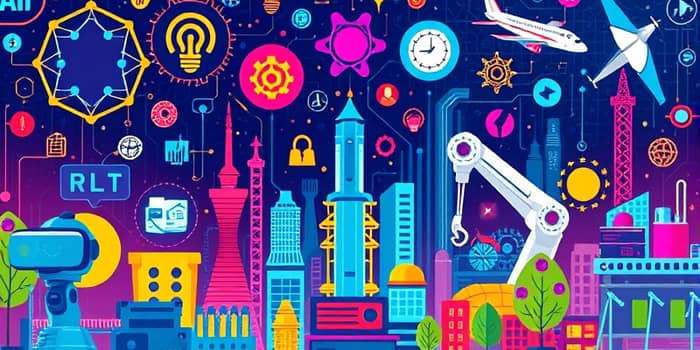
In a world driven by digital evolution, breakthroughs in technology are transforming industries and unlocking unprecedented investment avenues. From boardrooms to research labs, innovators are racing to harness the next wave of disruptive tools and platforms.
As 2025 approaches, investors and executives alike must navigate a landscape defined by rapid change, immense opportunity, and profound societal impact. This article explores the core innovations shaping our future and the strategic possibilities they present.
By 2025, AI will be deeply woven into the fabric of business and daily life. Companies are prioritizing AI to unlock dramatic economic and competitive impact and stay ahead of competitors. With 77% of organizations already leveraging AI, the technology is no longer optional.
Generative AI is also redefining hiring, with 71% of leaders more likely to recruit candidates skilled in these tools. Beyond human resources, AI-driven platforms optimize healthcare diagnostics, financial risk modeling, and personalized education, often operating invisibly behind familiar interfaces.
Quantum computing promises unprecedented computational processing power, tackling complex cryptography, materials science, and drug discovery problems at speeds unattainable by classical machines. Though still in early stages, this technology poses both opportunity and challenge.
As quantum processors scale, traditional encryption methods face obsolescence, driving urgent investment in quantum-safe security protocols. Early backers of quantum startups and research initiatives may gain an edge in finance, logistics, and life sciences as practical applications emerge.
The fusion of IoT devices with AI-driven analytics is delivering real-time operational and decision-making efficiency. From smart factories to connected vehicles, businesses can now collect massive data streams and turn insights into action within seconds.
Industrial IoT adoption accelerates alongside 5G deployment, unlocking high-speed connectivity and precise tracking. However, as the number of endpoints multiplies, robust cybersecurity and privacy safeguards are essential to maintain trust and resilience.
Industry 4.0 encompasses the integration of robotics, automation, and advanced analytics in manufacturing and supply chains. Sectors with repetitive tasks—manufacturing, logistics, and retail—boast 1.3 times higher automation potential, leading to game-changing manufacturing and operational efficiency.
Organizations pursue three adoption paths—accelerated, strategic, or selective—based on legacy infrastructure and capital. Pioneers report substantial reductions in operational costs, faster production cycles, and safer workplaces as human roles shift toward oversight and innovation.
Augmented reality (AR) and virtual reality (VR) technologies are breaking new ground in training, sales, and collaboration. Corporations use immersive simulations to shorten onboarding times, while retailers let customers virtually try products before purchasing.
As hardware costs decline and software ecosystems expand, AR/VR is set to penetrate education, healthcare, entertainment, and beyond, offering mixed-reality experiences that engage users more deeply than traditional media.
Additive manufacturing is enabling rapid, customized production on-demand. Industries from aerospace to healthcare leverage 3D printing to produce complex parts and patient-specific implants with minimal tooling and reduced waste.
On-site production and digital inventory models are reshaping supply chains, cutting lead times, and enabling more sustainable operations—especially critical when global disruptions strain traditional logistics.
ESG considerations have moved from checkbox exercises to core strategic imperatives. Technological advances in renewable energy, energy storage, and resource optimization drive a high-growth sustainable investment frontier as corporations and governments aim for net-zero targets.
Innovations like advanced battery chemistries, smart grids, and carbon capture systems demonstrate how environmental stewardship and profitability can align in synergy.
Global technology spending is on track to surpass $3.9 trillion by 2025, creating diverse investment pathways—venture capital, M&A, and public equities. Each innovation presents unique risk-reward profiles that demand nuanced strategies.
Beyond core innovations, several cross-cutting trends demand attention, including a rapidly evolving regulatory landscape that shapes technology adoption.
Regionally, China is investing $150 billion to lead AI by 2030, while North America and Europe remain innovation hotspots for startups and enterprise digital transformation. Investors should tailor strategies to each market’s regulatory climate, talent pool, and infrastructure readiness.
Technological innovation demands proactive engagement, strategic partnerships, and continuous learning. Leaders must adopt an agile mindset and future-oriented vision to harness emerging opportunities and mitigate risks.
By fostering adaptability, building resilient portfolios, and championing responsible innovation, businesses can generate returns while driving positive societal impact. The technologies shaping 2025 and beyond will define the next era of human progress—invest wisely, adapt rapidly, and lead with purpose.
References













